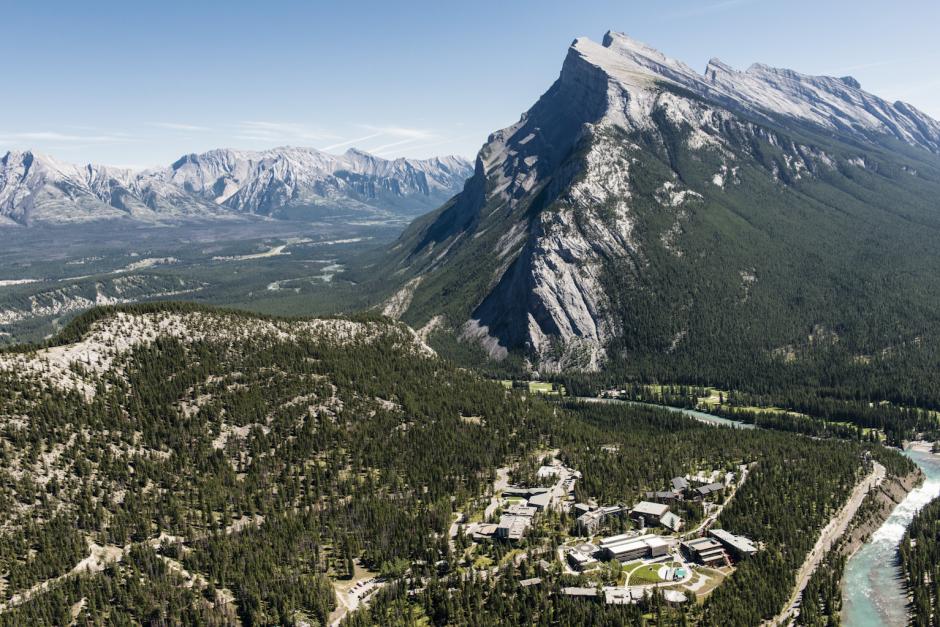Approaching Banff Centre’s Margaret Greenham Theatre, the temptation to stop and stare is too overpowering to resist. Beyond the paved footpath and scattered stands of fir and spruce, the surrounding mountains contain the sky. A visitor is left speechless. The feeling of smallness is monumental.
Inside the modest post industrialist-style building nestled mid-campus, Open Space stage director Joel Ivany and music director Topher Mokrzewski are far from diminutive, however, in their enthusiasm for the opera program’s latest offering, an unsettling opéra-rituel de mort by French-Canadian avant-gardist Claude Vivier.
Asked to describe the work, an electrifying chamber piece in which a young woman finds renewed existence after death, Ivany answers almost reflexively. “For me, it says life doesn’t end when it ends. You can be an atheist and believe that. You can be a Catholic. You can be a Buddhist. But there is something about this energy that offers hope in a lot of ways.”
Vivier, a Montreal composer who ventured far beyond even the most experimental music of his day, seemed driven to respond to life’s big questions. Abandoned by parents he never knew, raised in an orphanage by the Sisters of Charity, the bright, restless castaway gravitated to the priesthood as a young man only to be rejected for his overabundance of “sensitivity”. The Conservatoire de musique du Québec à Montréal, a sanctuary for 60s non-conformists, accepted him, his dangerous predilection for the local demi-monde notwithstanding. Professional support and encouragement was not always forthcoming. Nevertheless it was there that Vivier began to make his first impression on the Montreal performing arts scene, drawing from a bottomless well of troubled personal experience.
“I think one element that really motivated him were feelings of rejection,” says Mokrzewski.
Ivany agrees. “Instead of trying to find out who he was, he used that as a kind of mantra. I am unknown. I am unloved. So I have to find comfort elsewhere. The loneliness was his comfort.”
A perpetual seeker of self, Vivier travelled widely, studying with Karlheinz Stockhausen, radical electronicist, in Germany, then on to the Far East in the mid 70s. Trips to Japan, Thailand and Indonesia opened new doors to expression, musical and spiritual both. Exotic experiences and sounds folded and blended into his formal conservatory education, combined with a fervent admiration of Messiaen, Debussy and Stravinsky — influences much in evidence in Mokrzewski’s assessment — Kopernikus emerges as something of an operatic hybrid.
“The first term I came up with to describe it is Francophone Space Music,” says the irreverent maestro only semi-jokingly. “It doesn’t quite encapsulate everything but I think the space part is huge because even if it’s not the majority of the music, that’s the direction the whole piece goes.”
Kopernikus is, as Mokrzewski intimates, cosmic in scope though not specifically focused on the celebrated heliocentric astronomer as might be reasonably assumed from the opera’s title. A core group of 7 otherworldly singer actors constitute one half of the dramatic population on stage, balanced by 7 very visible musicians.
“Here you’re not dealing with human characters, really,” says Ivany. ‘So what are they? Are they spirits? Are they angels? We have to try to imagine something we don’t know as ground zero.”
Language, a favourite plaything of Viver throughout his career, often proves just as alien in this acutely metaphysical theatrical excursion. English, French and German all factor into the work, not to mention a serious smattering of self-invented, utterly indecipherable phrases, verbal concoctions drawn from Vivier’s imagination.
“I think he intentionally wanted us to understand less and less,” suggests Ivany. “to make us try and figure things out. If you look at the score, you can see whole parts written in French that he’s scratched out and then written over in his own language.”
Mokrzewski offers another point of view. “I wonder if it’s a kind of universality meant to eradicate the differences of language in a way.”
“In our production,” says Ivany of his Kopernikan cast of celestial beings, “they all understand it. It’s their language in another dimension.”
First presented in 1980 at Montreal’s Monument-National theatre, Vivier’s one and only opera essentially guaranteed the composer near cult status among an elite troupe of Québécois musical insiders yet made virtually no impact whatsoever in English Canada at the time. Almost 40 years later very little has changed. Even in Vivier’s home province his reputation appears to be somewhat on the wane today.
“If you speak to any major opera company in Canada,” says Ivany, “they won’t do Kopernikus because, one, it’s small. You can’t put it on in a 2000-seat theatre. And, two, I think they think their audience may not be able to process what it is. Vivier found this unique sound that was unlike anything that existed at its time.”
Passions run high with this duo. This Banff Centre Kopernikus shows all the signs of history in the making, a production destined not only to survive beyond its Canada 150 celebratory mandate — it will travel to Toronto in the spring of 2019 — but more importantly, to elevate Vivier, creative visionary, to a position of rightful national and, quite possibly, international prominence.
Says Ivany with characteristic understatement, “For these singers, for this audience, I think it’s going to be very impactful to remember when we did this piece.”
Mokrzewski is less circumspect. His determination to give solid shape to Vivier’s edgy genius is unshakable. “I love this piece. It’s very difficult to pull off all that’s there. But you feel such an intense desire to make it happen.”
“Possibly Canada’s greatest chamber opera,” continues Ivany.
“I’ll go out on a limb so you don’t have to,” declares Mokrzewski. “I’ll say it is Canada’s greatest opera.”
Ivany tags the statement with a prompt series of emphatic nods.
* * *
Kopernikus by Claude Vivier plays at Banff Centre for the Arts Margaret Greenham Theatre, Thursday, July 6, 7:30 P.M. and Saturday, July 8, 7:30 P.M.
Photo by Don Lee


